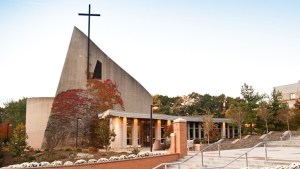A high school student wrote to me asking about college. Is it really necessary? Why not just start life early? Aren’t there plenty of other ways to learn the things I need to know, while skipping so many things I don’t need to know?
Well, of course college isn’t necessary — or even desirable — for many young people. And there are many colleges that are dedicated to a worldview so antithetical to Jesus Christ’s that they are best avoided by most.
But for many young people, going to a Catholic university that treats Jesus Christ as the Way, the Truth and the Life has benefits far beyond what you study (full disclosure: I work at one). Here are five:
First, discipline. College gives you the skills you need to “play the game of life.”
It is often said that there are three things you want in college, but you can only have two: 1. A social life. 2. Good grades. 3. Sleep.
In fact, you get to pick all three, but you have to learn how, and college professors can tell which students have or haven’t figured that out.
When a student does learn how to balance them all, they are ready for life. They have learned to negotiate with peers, professors, and the campus bureaucracy — and have taken various forays into life off campus, learning its dangers and offerings.
College is a great halfway house between being under your parents’ roof and being responsible for your own.
Second, your intellectual capacities grow.
In college, it almost doesn’t matter what you learn; what matters most is that you learn. In late teens/early 20s human brain development is in a truly momentous stage, where the more you challenge your mind the more capacities it gains.
It’s like weight-lifting. You never have to bench press a barbell on a basketball court, but people who put in time in the weight room do better on the court because they have greater capacity, and stamina, to play the game. That happens with your brain. I have never had to know professionally who Aeneas is or how to do complex math — but taking these subjects gave my brain the workout that prepared it to learn a new industry in a corporate job, and policy issues on Capitol Hill.
Third, college gives you lifelong peers.
At one point in the 1980s Boomer nostalgia movie The Big Chill, friends from college are reconnecting at dinner.
“I feel like I was at my best when I was with you people,” says one.
“When I lost touch with this group I lost my idea of what I should be,” said another.
They are noticing what psychologists see: Lifelong friendships are of huge importance. We all need people who are with you through thick and thin, who know you at your best and can remind you who you are when they find you at your worst.
I saw that recently with two college friends last weekend. One helped me in an incalculably significant way, without being asked. Another helped me process things in a way no one else can.
These friendships are forged by staying up way too late speaking frankly and then going on adventures and getting into scraps together — things that happen naturally in college and not so easily outside it, and they are all the stronger because we share our faith.
Fourth, colleges give you a network that can jump start your career.
College connections led to nearly all of my jobs, first as a corporate speech-writer, than a journalist, then on Capitol Hill.
Every school delivers a network, but going to a Christ-centered Catholic school delivers a network that is different in kind, because the people you meet don’t just see you from the same Alma Mater, they see you as from the same heavenly mother with the same urgent mission.
Fifth, colleges give you opportunities that are very hard to come by otherwise.
At Benedictine College, our students don’t just get to sit daily at the feet of men and women deeply steeped in their disciplines — they also get to meet and discuss their futures with the top Catholic leaders in many fields who come to campus.
At not just that. My own children are grateful for the opportunities that were easy to get in college: Travel to India, mission trips in the Caribbean, a semester abroad, performing on stage, academic conferences, and work with disadvantaged youth.
Sixth, college roots your beliefs in study.
Faith becomes richer at a Christ-centered college in much the same way as secularism becomes hardened at a world-centered college. In both cases, college connects your beliefs to structures and traditions of thought that make your beliefs far more powerful. Your worldview gets a lot more reference points and “mental furniture” in it, locking it down.
Going to a Christ-centered college will enrich you your whole life long — and for eternity, too.



